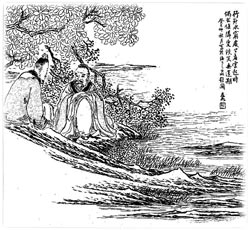Origins and Ideological Sources of Religious Taoism (3)

By Liu Feng, Lao An, etc.
1. The Origin of china’s Primitive Religious Cults
2. Religious Taoism in Relation to the Yin-yang and Five Elements Theory
3. Religious Taoism in Relation to the Doctrine of Immortality and the Occult Science
3. Religious Taoism in Relation to the Doctrine of Immortality and the Occult Science
The chief pursuit of religious Taoism may be said to be a long and serene life and become an immortal on earth. And such an idea of immortality became an important constituent of religious Taoism. However, it came into existence long before the rise of Taoism. For instance, the Classic of Mountains and Seas carries quite a number of records of the theory of immortality which existed for long. As a matter of fact, by the time of the Spring and Autumn Period and the Warring States Period, the social productivity had grown considerably, man’s ability to conquer nature had been enhanced, and man’s role in social production began to become prominent and be gradually recognized. All this found its Clear expression in people’s scepticism of Heaven’s will and the existence of any spiritual beings and in the tendency to stress more on man himself than on the deities.
The social progress in the human world promoted the awakening of man’s self-consciousness, and at the same time enhanced his pursuit for his own values, thus arousing the longing of people for a long and serene life. For instance, fluke Xiang of the State of Qi once asked Heaven why the term of human life was so short, while Duke Jing of that same state once shed tears in the capital, lamenting the shortness of human life.
Stimulated by such a longing, the theory of immortality appeared in areas along the east coast of the country, while in West China, there appeared the advocation of the theory of nourishment of life initiated by the philosopher Zihua Zi. In the following ages, along with the development of the arts of nourishing life and curing diseases, some achievements were made in improving health and curing diseases, and there were legendary figures who enjoyed miraculous longevity. For example, Peng Zu, a high official of the Shang Dynasty, lived for more than 800 years because he constantly took in cassia twigs and was good at doing physical and breathing exercises. For another example, Duke Rongcheng of the Zhou Dynasty, who claimed to be the teacher of the Yellow Emperor and once made an audience with King Mu of Zhou, was particularly good at nourishing life and doing physical and breathing exercises. In his old age, consequently , his hair turned black again from white, his teeth cut again after they came off, and lived as long as the legendary Lao Zi did. All this reflected the good wish of the ancients for a long life. To make such a dream come true, people began to seek for the so-called elixir of life. A well-known Chinese myth goes that Chang’e, wife of the formidable bowman named Yi, stole and drank the liquid of elixir distilled by the deity the Holy Mother of the West for the banquet held by King Mu of the Zhou House on Mt. Kunlun, and, as a result, she flew and ascended into the palace in the moon. It is true that it is nothing but a myth, but from it we can still perceive the eagerness of the people of antiquity to find some kind of elixir and a way to immortality.
 During the time from the Spring and Autumn Period and the Warring States Period through the period from the Qin Dynasty to the Han Dynasty, the pursuit of an everlasting life and immortality gradually became very popular owing to the discussions carried on the subject among scholars, the advocation on the part of the practitioners of occult science and the favor and patronage given by emperors and princes. And, following its steps, such a theory was inherited and developed by religious Taoism and became one prominent constituent characterizing this indigenous Chinese religion and making it radically different from all the heterogenous religions. The theory of immortality, as an important ideological source of religious Taoism, was indebted, to the greatest extent, to philosophical Taoism among all the philosophical schcols during China’s pre-Qin times, especially to the two masterpieces of the Taoist school the Lao Zi and the Zhuang Zi.
During the time from the Spring and Autumn Period and the Warring States Period through the period from the Qin Dynasty to the Han Dynasty, the pursuit of an everlasting life and immortality gradually became very popular owing to the discussions carried on the subject among scholars, the advocation on the part of the practitioners of occult science and the favor and patronage given by emperors and princes. And, following its steps, such a theory was inherited and developed by religious Taoism and became one prominent constituent characterizing this indigenous Chinese religion and making it radically different from all the heterogenous religions. The theory of immortality, as an important ideological source of religious Taoism, was indebted, to the greatest extent, to philosophical Taoism among all the philosophical schcols during China’s pre-Qin times, especially to the two masterpieces of the Taoist school the Lao Zi and the Zhuang Zi.
Taoism as a schcol of philosophy advocates quietude and nonaction (wu wei) and to let everything develop in its natural course. It holds that the Tao (way) is the origin of the myriad things in the universe and is the law governing the changes of all things. In the respect of self-cultivation, philosophical Taoism holds that there exists a way to an everlasting life with unfailing senses, as there is quite some space dedicated to the discussion of such a point in the Lao Zi. The way to increase the span of existence as advocated by Lao Zi chiefly emphasizes the self-nourishment of life. But at the time, people widely believed that one who was good at nourishing life had no fatal point whatsoever all over the body, no beasts could ever hurt him and even weapons could not work upon him. Therefore, such a man was not afraid of facing female rhinoceros or tigers on his way and did not need any armor to protect himself in any kind of fighting. According to tradition, Lao Zi himself was particularly good at nourishing his life, and lived for more than 160 years or even 200 years, thus well deserving the name of a man of great achievement in increasing the span of his life. Naturally, the philosopher Lao Zi’s great achievement lies not only in enjoying a long life himself, but, more significantly, in his proposal for the way to obtain a long life with unfailing senses. He believes that the most important point in prolonging one’s life is to “keep your soul, embrace unity, and forever hold fast to the Tao,” i.e. , to keep the unquiet physical soul from straying the body; in so doing, the key point is “never let the Valley Spirit die,” i.e. to cultivate one’s mind and never make it exhausted. And for this purpose, one should always keep one’s mind in a state of constant tranquility and indifference to fame or gain; one must adhere to the principle of quietude and non-action (wu wei), selflessness, few desires, happiness out of contentment and hold oneself aloof from the earthly world.
On the other hand, the Zhuang Zi proposes a number of arts for the way to immortality and carries quite some descriptions of various immortals on earth. In its opinion, the Tao (way) is metaphysical; it can be passed on but can never be taught; and it can be acquired but can never be perceived. It made the ghosts holy and the rulers divine and gave birth to both heaven and earth. It is not high although it exists above the Great Ultimate, nor is it deep though it exists below the Sixth Ultimate. It came into being before both heaven and earth and yet it is not ancient; it began to work long before the remote ancient ages and yet it is not old. The functions of the Tao are boundless and miraculous. It was just because of their attainment of the Tao that the kings, the Divine Men, the immortals and the sages of antiquity became extraordinary. The Yellow Emperor, for instance, obtained the Tao and then ascended to heaven, while the Holy Mother of the West obtained the Tao and is residing in the Shaoguang Palace and her dates of birth and death remain unknown.
In the Zhuang Zi, immortals, including the Genuine Man, the Perfect Man and the Divine Man, are all vividly described. It is said that the Genuine Men of the ancient ages never feared any height they climbed, were never drowned in any deep water they dived into and were never burnt in any fire they stood in. They never dreamed in sleeping and never worried about anything when awakening; they were never greedy in eating and always breathing deeply.
The book tells us that the Genuine Man respires out of or into his heels rather than through the throat like an ordinary man does; he has wonderful magic power as he can rnake the sea frozen though it is not cold at all and can cleave great mountains with fierce thunderbolts; he can mount the clouds, speed across the sky, ride on the sun and the moon, and visit all the five lakes and the four seas. In the Zhuang Zi, there is a tale which goes: there lives in a great mountain a Divine Man, whose skin looks as white as ice and snow and whose figure is as slender and graceful as that of a maiden. He does not live on food, but takes in wind, drinks dew, rides on the back of a dragon, flies through the misty air and roams beyond the boundaries of the four seas. Such carefree excursionalists as depicted in the Zhuang Zi who ride on the clouds, speed through the misty air, roam within or beyond the boundaries of the four seas and are never limited by any connditions are indeed the most ideal im mortals visioned or dreamed by Zhuang Z
Furthermore, it is believed in the Zhuang Zi that the practice of the Tao enables people to recover their youthful vigor and promises longevity. The book carries very concrete and detailed instructions about the methods to practice the Tao. It advices that in doing the physical and breathing exercises, one should respire with an open mouth, exhale the foul air and inhale the fresh air. The person should hang himself like a bear onto the branch of a tree and stretch his limbs like a flying bird. However, such exercises are to be done merely for the purpose of prolonging life and they are preferred by people who are engaged in doing physical and breathing exercises and take good care of the shapes of their boodies as well as those who intend to enjoy a long life such as Peng Zu. That is only the first and preliminary method of practicing the Tao.
The second method of practicing the Tao, according to the Zhuang Zi, is to hold the Primal Unity. It is said that Master Guangcheng Zi was lying on his back with his head pointing to the south when the Yellow Emperor prostrated himself in the wind before the master, crawled on his knees, and, after kowtowing for several times, begged, “Sir, I am told that you have attained the perfect Tao, and I wonder how should one build up one’s health so that one can live long?” Master Guangcheng Zi stood up quickly and replied, “An excellent question! Come on, and I will tell you what the perfect Tao is. Essentially, the perfect Tao is distant, dim, lusterless and soundless. It cannot be seen, nor can it be heard. As long as you can hold your soul and sink into quietude, your health will be regulated naturally. But only when you keep absolutely serene, can you obtain quietude within yourself. Remember, never make your body fatigue and never make your soul in a trance. In such a way, you can live long. Besides, you should not try to see anything with your eyes, not try to hear anything with your ears and not try to think about anything in your mind, so that your soul can hold fast to your body and you will enjoy a long life. Try your best to free yourself of all kinds of worries, and the abundance of your knowledge will lead you to a most brilliant future. Try your best to hold yourself and the myriad things will flourish naturally. Personally, I have held myself fast to the right Tao and always placed myself in the harmony between the yin and the ying. That is why my health has been taken good care of. I have been living now for 1, 200 years and my health has never shown any sign of decline.”
The third method of practicing the Tao is to sit in a void mind. In the Zhuang Zi, it is suggested in the name of the in quiry and reply between Confucius and his favorite disciple Yan Hui. It is said that one day, Yan Hui mentioned to his master Confucius that he had made some progress. Confucius asked, “In what respect?” Yan replied, “In the fact that I have forgotten the principles of humanity and righteousness.” A few days later, Yan Hui mentioned again to his master that he had made some further progress as he had forgotten the significance of rites and music. Another few days passed and Yan went to Confucius again, saying, “Sir, I have made the greatest progress, as I am able now to sit in a void mind.” At this, Confucius felt surprised and asked about the true meaning of sitting in a void mind. Yan Hui replied, “Make no use of your limbs, discard your intelligence, get away from your body and rid yourself of your wisdom. Then, keep yourself open and blend yourself completely with the great Tao. That is the way to sit in a void mind.”
The three methods of practicing the Tao listed above as suggested by Zhuang Zi was inherited and developed by religious Taoism in the following ages. Besides, the immortals depicted in the zhuang Zi such as Guangcheng Zi, the Yellow Emperor, the. Holy Mother of the West and Peng Zu were greatly revered and worshiped by the practitioners of occult science and Taoist priests of the following ages.
In his monumental work the Complaints in Excile (Li Sao) by Qu Yuan (c. 340 BC – c. 278 BC), the country’s brilliant poet of the Warring States Period, there are also quite a number of lines expressing the longing for immortality and tales of immortals. The vivid and romantic tales of visionary roves and dreaming to ascend to heaven in this work share strong similarities with the tales of the immortals described in the Taoist scriptures of the later ages. This testifies that at the time the doctrine of immortality was considerably popular in the southern states of the Warring States Period. Under the influence of such a doctrine, not only ascending to heaven and becoming a celestial being were longed for by the world, but physical and breathing exercise began to be done widely.
Furthermore, in both the Zhuang Zi and the Elegies of Chu such occult arts as the making of elixir of life are also discussed. Indeed, at the time, people who were engaged in alchemy to seek for a long life were by no means few. As a matter of fact, the talk of immortals and the elixir of life was very popular in the northern states such as Yan and Qi. In fact, such a tendency could be seen in the legendary miraculous deeds of Bian Que, the well-known physician of Shangdong.
According to the Records of the Historian, Bian Que was a native of the county of Bohai and used to be the manager of an inn in his youth. There at his inn long stayed a guest named Changsang Jun, whose extraordinariness in his laudable demeanor could be discerned by Bian Que alone. Thus, Bian Que often entertained the man, while Changsang Jun, in his turn, also knew that Bian was no ordinary man. One day, Changsang Jun invited Bian Que to have an individual talk with him, and said to him in a mysterious manner,”I’ve got a secret recipe for the elixir of life. Since I myself am aged, I intend to pass it onto you. But you must never disclose it.” Bian Que promised, “I will keep it a secret forever.” Then, Changsang Jun gave him a doze of the drug and told him, “This medicine has to be swallowed down with rain-water which has never fallen on the ground. Then, after 30 days, you will be able to see through all things.” Finishing these words, the old man disappeared abruptly. That made Bian Que realiz that the old man was some supernatural being. So he immediately began to do what he was told and after taking the medicine for 30 days, he could really see any person standing on the other side of a wall. In pursuing his career as a physician, Bian Que resorted to such an unusual ability and managed to find out the focus oi diseases within the internal organs by seeing through the body. From such a tale, we can see that Bian Que was extraordinary in deed. On the one hand, the old man Changsang Jun who offerred Bian Que the magic drug and the secret recipe not only had a keen insight into a man’s moral character, but was miraculously powerful himself. Cn the other hand, after he took the drug offered by Changsang Jun for 30 days, Bian Que 5 vision became won derfully sharp, as he could see through a wall and the human in ternal organs. The tale that Changsang Jun the Divine Man offered the magic drug and made Bian Que 5 vision wonderfully sharp should have been the anticipatory model of the popular belief in immortals and the elixir of life during the following ages.
Since the existence of immortals and fairylands was widely believed, there were necessarily people who made serious and enthusiastic efforts in their pursuing. In attaining the way to immortality, the key point was how to break through the deadline of one’s life span and realise the immortality of the individual. Thus, recipes for everlasting youthfulness and immortality emerged as the times required.
During the Warring States period, occult wizards from the coastal areas of the State of Qi cooked up a story and spread it all around, saying that there in the great sea were three holy mountains respectively known as Penglai, Fangzhang and Yingzhou, where resided some immortals in possession of elixir of life. Besides, the states Yan and Qi bordered the sea on the east and, influenced by the atmospheric circulation, people there often saw mirages, which either mirrored mountains, rivers and plants, or presented citadels and human figures. The illusory and changing sights and the dim and misty scenes on the esa kept arousing people’s association and reverie. Along with the hearsay of the foreign countries beyond the sea and the legendary elixir of life, a tradition was gradually formed about the existence of some fairylands and the three holy mountains. In the chapter “Sacrifices offered to Heaven and Earth at Mt. Taishan” of the Records of the Historian, it is said that, allegedly, all the three holy mountains are located in the Bohai Sea, not far from this earthly world. However, whenever ships or boats are close to these holy mountains in their search, they will be blown far away by wind and cannot even touch a grain of their soil at all. There are some people who did visit those moutains, and according to them, there are indeed quite a number of immortals who posss the elixir of life; everything in the mountains including birds and beasts is white in color, while all the palaces and halls there are built up with gold and silver.
Before arriving in the mountains, if you look in the distance, you will see a sea of clouds; but when you have arrived there, you will find that the mountains lie below the surface of the sea. If you insist going further and closer, most likely, you will be blown away by the wind. It is said that Prince Wei of Qi (378 – 324 BC) and Prince Zhao of Qi (317 – 297 Bc) did once send to find out the truth. That was why “No rulers of the world can refuse the temptations” of the three holy mountains. They not only became the inducement for the First Emperor of Qin and Emperor Wu Di of Han to dream to become immortals, but also served as one of the ideological sources of the Taoist theory of tak ing elixir and attaining immortality. Compared with theory of self-cultivation to achieve immortality as advocated by both Lao Zi and Zhuang Zi, this tradition is aimed at the same goal by different means. Both theories promoted the growth of the two chief sects of internal alchemy and external alchemy within the Taoist religion as a whole.
Religious Taoism began to be known as the Way of Occult Immortality, as it is carried in the chapter “Sacrifices Offered to Heaven and Earth at Mt. Taishan” of the Records of the Historian. The author of the work Sima Qian says that under the reigns of Prince Wei and Prince Xuan of the State of Qi, Song Muji, Theng Boqiao, Chong Shang and Xian Mengao, all from the State of Yan, believed in and practiced the Way of Occult Immortality, transformed themselves into supernatural beings and joined ghosts and spirits. It is said that Song Muji and Zheng Bo qiao were immortals of the ancient times and people of the State of Yan named thensselves after them. Hence the popular saying,
“Everyone is named after the immortals in great admiration.” At the time, it was believed that occult wizardry practiced by the Way was able to make one’s soul to get away from one’s body and join with the spiritual beings. Besides, after taking in the elixir, one might become an immortal on earth. That was why it was known as the Way of Occult Immortality. Practitioners of the occult arts from the states Yan and Qi once agitated Prince Wei of Qi, Prince Xuan of Qi, the First Emperor of Qin and Emperor Wu Di of Han to send to call on immotals and search for elixir in all the guarters of the country.
OPENING HOURS
| Week Days | 8:00 – 5:00 |
| Saturday | 9:00 – 5:00 |
| Sunday | 11:00 – 4:00 |




